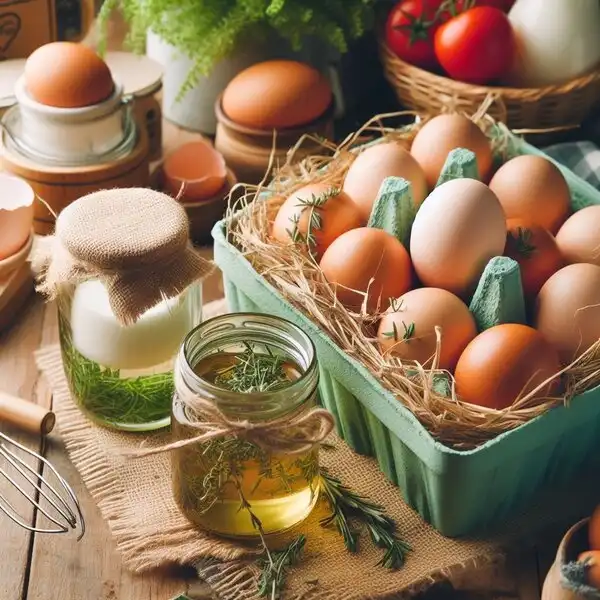The Ultimate Guide on How to Handle Farm Fresh Eggs
Introduction
As the sun rises over a homestead, there's a certain joy in collecting farm-fresh eggs, glistening with the morning dew. For those living the homesteading life, this ritual is not just about sustenance; it's a celebration of the natural cycle of life and the bounty it brings. In this comprehensive guide, we'll delve into the art of handling farm-fresh eggs with care and expertise, ensuring that every egg is cherished and every omelet is a masterpiece.
Embracing the Homesteading Lifestyle
Homesteading isn't just a way of life; it's a philosophy rooted in self-sufficiency, sustainability, and a deep connection to the land. From tending to vegetable patches to raising livestock, homesteaders embrace the rhythms of nature, living in harmony with the seasons. And at the heart of this lifestyle are the humble farm-fresh eggs, a symbol of abundance and vitality.
The Importance of Proper Egg Handling
While the sight of a basket brimming with fresh eggs is a sight to behold, it also comes with the responsibility of proper handling. Egg handling techniques are not just about preserving freshness; they're about honoring the labor of our feathered friends and ensuring that each egg reaches its full potential. From the moment an egg is laid to the moment it's cracked open, every step matters in maintaining its quality and flavor.

Maximizing Freshness and Shelf Life
The journey of a farm-fresh egg begins long before it reaches the kitchen table. From the nest to the egg carton, every stage plays a crucial role in preserving its freshness. By understanding the natural protective layer that coats each egg, we can unlock the secret to maximizing shelf life and savoring the taste of farm-fresh goodness.
A Homesteader's Dilemma: To Wash or Not to Wash?
One of the most hotly debated topics in the world of egg handling is whether to wash farm-fresh eggs. While it may seem counterintuitive to leave dirt and debris clinging to the shells, washing eggs can actually do more harm than good. We'll explore the science behind this age-old dilemma and uncover the best practices for keeping eggs clean without compromising their integrity.
TIP: Always read through the entire recipe before starting to ensure you have all the necessary ingredients and tools.
Refrigeration: Necessity or Luxury?
In the age of modern refrigeration, the question of whether to refrigerate farm-fresh eggs remains a point of contention. While some argue that refrigeration is essential for food safety, others believe that room temperature storage is not only sufficient but preferable. We'll weigh the pros and cons of each approach and provide insights tailored to different family sizes and consumption rates.
In the next sections, we'll delve deeper into the nuances of proper egg handling and storage, equipping homesteaders with the knowledge they need to make informed decisions and preserve the freshness of their precious eggs.
Proper Handling and Storage of Farm Fresh Eggs
In the realm of homesteading, proper handling and storage of farm-fresh eggs are as vital as nurturing the chickens that lay them. From the coop to the kitchen, every step in the journey of an egg plays a crucial role in preserving its freshness and flavor. In this section, we'll explore the best practices for handling chicken eggs, storing them, and determining their freshness without cracking them open.
Subsection: Handling Chicken Eggs
Emphasizing Cleanliness for Quality Eggs
Maintaining cleanliness in the hen house is paramount to ensuring that eggs come out pristine. A clean environment not only reduces the likelihood of dirt and debris clinging to the eggs but also minimizes the risk of bacterial contamination. Regular cleaning of nesting boxes, coop floors, and egg-laying areas is essential for producing high-quality eggs that are free from contaminants.
The Importance of Not Washing Farm-Fresh Eggs
Contrary to popular belief, washing farm-fresh eggs is not recommended as it removes the natural protective layer present on the eggshell. This protective coating, known as the bloom or cuticle, acts as a barrier against bacteria and helps to seal the pores of the eggshell, preserving its freshness. Washing eggs can strip away this protective layer, making them more susceptible to contamination and shortening their shelf life.
Addressing the Refrigeration Question
One common question among homesteaders is whether farm-fresh eggs need to be refrigerated. The answer depends on various factors, including family size, egg consumption rate, and environmental conditions. While refrigeration can extend the shelf life of eggs, it's not always necessary, especially if eggs are consumed relatively quickly. Room temperature storage is sufficient for unwashed farm-fresh eggs, provided they are kept in a cool, dry place away from direct sunlight.
Subsection: Proper Farm Fresh Egg Storage Tips
Storing Unwashed Eggs at Room Temperature
Farm-fresh eggs can safely be stored at room temperature for several weeks if they are unwashed and free from cracks or blemishes. To maximize freshness and minimize the risk of spoilage, it's essential to store eggs properly. Egg organizers or labeled egg cartons can help track egg freshness, ensuring that older eggs are used first while fresher ones are kept for later consumption.
Preserving the Natural Freshness of Eggs
Avoiding the temptation to wash clean eggs is crucial for preserving their natural freshness and protective coating. If eggs do become dirty or soiled, a homestead hack for cleaning them involves dipping them in warm water and allowing them to sit for a few minutes. This gentle method helps loosen dirt and debris, making it easier to wipe them clean without compromising their integrity.
Homestead Hack: Washing Dirty Eggs
In cases where eggs are particularly dirty or muddy, a simple warm water bath can work wonders. By immersing dirty eggs in warm water and allowing them to soak for a brief period, stubborn dirt and stains can be loosened, making them easier to wipe away. This gentle cleaning method ensures that eggs remain fresh and free from contaminants, preserving their quality for longer.
Subsection: Determining Egg Freshness
The "Bad Egg Test" Method
Determining the freshness of farm-fresh eggs without cracking them open is possible using the "bad egg test" method. By placing eggs in a bowl of room temperature water, their buoyancy can indicate their freshness. Fresh eggs will sink to the bottom and lay flat, while older eggs may stand upright or float due to air pockets that develop over time.
Understanding the Age of Store-Bought Eggs
Compared to farm-fresh eggs, store-bought eggs are often much older, having been stored for several weeks or even months before reaching consumers. This extended storage period can result in a loss of freshness and nutritional value, highlighting the superiority of farm-fresh eggs in terms of flavor and quality.
In the following sections, we'll explore various methods for preserving farm-fresh eggs, ensuring that every egg is put to good use and none go to waste. From water-glassing to pickling, homesteaders have a plethora of options for extending the shelf life of their precious eggs, allowing them to enjoy the taste of freshness year-round.
Egg Preservation Methods
In the world of homesteading, the abundance of farm-fresh eggs during peak laying seasons can sometimes lead to a surplus. Rather than letting these precious eggs go to waste, savvy homesteaders employ various preservation methods to extend their shelf life and ensure that none are left behind. In this section, we'll explore the importance of preserving excess eggs and introduce a range of techniques to help homesteaders make the most of their bounty.
Highlighting the Importance of Egg Preservation
Maximizing the Harvest
During peak egg-laying seasons, homesteaders may find themselves inundated with more eggs than they can consume fresh. Rather than letting these eggs go to waste, preservation methods offer a way to maximize the harvest and enjoy farm-fresh goodness throughout the year. By preserving eggs at their peak freshness, homesteaders can ensure a steady supply of nutritious eggs even during times of scarcity.
Explore our extensive write-up on Comprehensive guide to growing using dill guide and discover all the nuances and important details. It's an engaging read filled with useful knowledge.
Reducing Food Waste
Preservation methods not only help homesteaders make the most of their egg harvest but also contribute to reducing food waste. By safely storing excess eggs, homesteaders can avoid the need to discard them and instead put them to use in various culinary creations. From pickled eggs to frozen egg patties, there are countless ways to repurpose surplus eggs and minimize waste on the homestead.
Overview of Preservation Methods
Water-Glassing
Water-glassing, also known as egg preservation in water glass, is a time-honored method of extending the shelf life of eggs. By submerging eggs in a solution of water glass (sodium silicate), homesteaders can create a protective coating around the eggshell, preventing air and bacteria from penetrating. This method can preserve eggs for several months, allowing homesteaders to enjoy fresh eggs even during the off-season.
Freezing
Freezing is a convenient and versatile method of preserving eggs for future use. Whether whole or separated into yolks and whites, eggs can be frozen in ice cube trays or freezer-safe containers for long-term storage. Frozen eggs can be thawed and used in a variety of recipes, including baked goods, omelets, and quiches, without compromising their taste or texture.
Pickling
Pickled eggs are a tangy and flavorful treat that adds a unique twist to traditional egg dishes. By brining hard-boiled eggs in a mixture of vinegar, spices, and herbs, homesteaders can create a delicious and shelf-stable snack that can be enjoyed on its own or as a garnish for salads and sandwiches. Pickled eggs can be stored in the refrigerator for several weeks or canned for long-term preservation.
Making Homemade Egg Noodles
Homemade egg noodles are a comforting and versatile addition to any homesteader's pantry. By combining flour, eggs, and a pinch of salt, homesteaders can create fresh and flavorful noodles that can be used in soups, stews, and pasta dishes. Homemade egg noodles can be dried and stored for future use, providing a convenient and nutritious option for busy weeknights.
Encouraging Exploration and Experimentation
Tailoring Preservation Methods to Preferences and Needs
The key to successful egg preservation lies in exploring different methods and finding the ones that best suit individual preferences and needs. Whether it's water-glassing for long-term storage or pickling for a tangy snack, homesteaders can experiment with various techniques to discover new ways of enjoying their farm-fresh eggs year-round.
Embracing Creativity in the Kitchen
Preservation methods offer homesteaders the opportunity to get creative in the kitchen and explore new culinary possibilities. From experimenting with pickled egg brines to mastering the art of homemade pasta, there's no limit to the delicious creations that can be made with farm-fresh eggs. By embracing creativity and innovation, homesteaders can elevate their egg preservation game and make the most of their harvest.
Dive into our article on Learn the secrets of homemade sugar scrub diy for a complete overview. We cover all the essential points and provide a lot of useful information.
In the next section, we'll summarize the key points discussed in this guide and invite readers to explore more about homesteading practices and self-sufficiency.
Find out everything you need to know about Learn the secrets of perfect corned beef crock pot cooking guide in our detailed article. It's a valuable resource for anyone looking to learn more.
Conclusion and Invitation to Explore Homesteading
As we conclude this comprehensive guide on how to handle farm-fresh eggs, we've explored the intricate nuances of egg production, proper handling techniques, storage methods, freshness testing, and preservation techniques. From the humble beginnings of egg-laying hens to the various ways of extending the shelf life of eggs, homesteaders are equipped with the knowledge and tools to make the most of their bounty.
Summarizing Key Points
Prioritizing Cleanliness
Maintaining a clean environment in the hen house is essential for ensuring that eggs remain free from contaminants and debris. By keeping nesting boxes clean and minimizing exposure to dirt and bacteria, homesteaders can produce high-quality eggs with a longer shelf life.
Avoiding Egg Washing
Contrary to popular belief, washing farm-fresh eggs is not recommended as it removes the natural protective coating on the eggshell. This protective layer helps seal the pores of the eggshell, preventing bacteria from entering and extending the freshness of the eggs.
Exploring Storage Options
Farm-fresh eggs can safely be stored at room temperature for several weeks if they are unwashed and free from cracks. Organizing eggs based on freshness and using them in a first-in, first-out manner can help maximize their shelf life and minimize waste.
Testing Egg Freshness
The "bad egg test" method offers a simple yet effective way to determine the freshness of eggs without cracking them open. By observing the buoyancy of eggs in water, homesteaders can gauge their freshness and use them accordingly.
Embracing Preservation Techniques
Preservation methods such as water-glassing, freezing, pickling, and making homemade egg noodles offer homesteaders a range of options for extending the shelf life of eggs. By exploring different preservation techniques, homesteaders can enjoy farm-fresh goodness year-round.
Inviting Further Exploration
As you embark on your homesteading journey, we invite you to delve deeper into the world of self-sufficiency, sustainability, and healthy living. Whether you're a seasoned homesteader or just starting out, there's always more to learn and discover.
Explore Related Content
Browse our website for a wealth of resources on homesteading practices, including gardening tips, food preservation techniques, herbal remedies, traditional cooking methods, and more. From raising livestock to cultivating your own vegetables, there's something for everyone interested in homesteading.
Subscribe for Updates
Stay informed about the latest homesteading trends, tips, and tutorials by subscribing to our newsletter. Receive weekly updates delivered straight to your inbox, keeping you inspired and motivated on your homesteading journey.
Join the Homesteading Community
Connect with like-minded homesteaders from around the world by joining our online community. Share your experiences, ask questions, and learn from others who share your passion for self-sufficiency and sustainable living.
By embracing the principles of homesteading and adopting sustainable practices, you can take control of your food production, reduce your environmental footprint, and lead a healthier, more fulfilling life.
Let's embark on this homesteading journey together and discover the joys of living closer to the land.

 Emma
Emma

